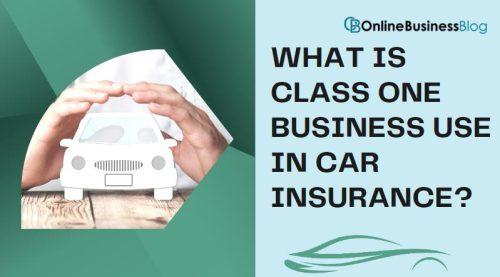Post Contents
Business use car insurance is a type of cover that is designed to protect your business against the risk of an accident, specifically when you are using a vehicle for work purposes. Some companies provide their employees with this cover as part of their employee benefits and it can be worth considering whether it could be right for you too.
What is Business Car Insurance?
Business car insurance is a type of insurance specifically designed for businesses. It provides coverage for vehicles used in business, including cars, trucks, and vans. Business car insurance can also protect your assets if you’re in a collision or theft.

Some of the benefits of business car insurance include:
- Coverage for vehicles used in your business
- Liability protection for yourself and your employees
- Deductibles and coverage limits tailored to your business needs
Do I need business car insurance?
Businesses need to be aware of the types of insurance that are required for their vehicles. Some of the most common types of insurance that businesses need are personal injury protection, property damage liability, and comprehensive coverage. It is important to speak with an insurance agent to get a full understanding of what your business needs and how much it will cost.
Who needs Business Car Insurance?
Businesses have different needs when it comes to car insurance than personal use vehicles.

Here are four reasons why businesses need business car insurance:
- Businesses have a lot more assets on their vehicles than personal use vehicles. This could include expensive equipment, files, or inventory. If a business is hit by an uninsured driver and loses the equipment or files, it can be a costly setback.
- Businesses travel in groups more often than personal use drivers. This means that if one vehicle is hit by an uninsured driver, the entire group could be at risk.
- Businesses may be driving more miles than personal use drivers. This could mean that their vehicle is put through more wear and tear and may require additional coverage.
- Businesses may have employees that are driving company cars and need to ensure their liability is covered in the event of an accident. This includes both personal injury claims as well as property damage claims.
Business car insurance class codes
If you operate a business, then you need to be aware of the different class codes your car will likely fall into.
The following is a list of the most common class codes and what they mean for your car insurance rates:
Class 5: This class is for cars with an annual mileage of fewer than 10,000 miles. These cars are usually not covered by comprehensive or collision insurance, and only have liability insurance.
Class 6: This class is for cars with an annual mileage of 10,000 to 25,000 miles. These cars usually have comprehensive and collision insurance, as well as liability insurance.
Class 7: This class is for cars with an annual mileage of more than 25,000 miles. These cars usually have comprehensive and collision insurance, as well as liability and property damage insurance.
Class 8: This class is for commercial vehicles including trucks, buses, limousines, vans, and motorcycles. These vehicles usually have comprehensive and collision insurance, as well as liability and property damage insurance.
What does Business Car Insurance cover?
Business car insurance is designed to protect businesses from financial losses that may occur as a result of accidents or other claims. Typical insurance coverage includes property damage, liability, and medical payments. In some cases, business car insurance may also cover the costs of renting a replacement vehicle while your own is in repairs.

A theft, or vandalism that prevents the vehicle from being driven legally by its owner, such as when someone steals the key from under the ignition.
An accident caused by driving under the influence of alcohol or drugs.
The operation of a vehicle that’s lost or stolen from another person. Note: When you lease a new vehicle with an automatic transmission, the vehicle’s estimated value will be based on its retail value, not its trade-in value. The lease contract may include a clause that states the lessee is responsible for all of the taxes and fees associated with the vehicle. These include any applicable state sales tax, title and registration charges, and excise tax. Make sure you understand these fees before signing any lease agreement. A fee is charged by insurance companies to finance their losses through shared risk pools or reinsurance arrangements.
Does it cost more to add business use to car insurance?
Adding business use to car insurance can be a cost-effective way to protect yourself and your customers.
Here are some things to keep in mind:
- You may be able to get a discount on your car insurance if you have business use included.
- Make sure you have the correct coverage for your vehicle and your business.
- Be sure to keep track of any changes or updates to your policy, as these could affect the cost of coverage.
What is class one business use in car insurance?
Class one business use is when a business uses a vehicle to conduct its regular business. This includes activities like delivering goods or services, transporting employees, and running errands. If you conduct any of these activities while using your personal car, you’re likely not covered by your business car insurance. Instead, you’ll need to buy personal car insurance specifically for use with your vehicle.

There are a few exceptions to this rule. If you operate a taxi or limousine, for example, you may be covered under your business’s commercial auto insurance policy. And if you drive for Uber or Lyft, your personal car insurance may also cover you while you’re driving for these companies.
How much does business car insurance cost?
Business use car insurance is typically more expensive than personal use car insurance. This is because businesses are typically driving more and taking more risks than the average person. For example, a business may drive more than the speed limit or run red lights, both of which increase the risk of an accident.
A business should also factor in any additional liability that may be incurred as a result of operating a vehicle as a business. This could include Worker’s Compensation Insurance, uninsured motorist coverage, and property damage liability. To avoid paying too much for business use car insurance, it is important to consult with an insurance advisor to determine what is necessary for protection against potential liability.
Conclusion
Business Use Car Insurance is a type of insurance that covers people who use their car for business purposes. This could include things like driving employees to and from work, transporting goods or clients, or conducting official business. Business Use Car Insurance can help protect you if something unexpected happens while you’re using your vehicle for business, such as an accident.


